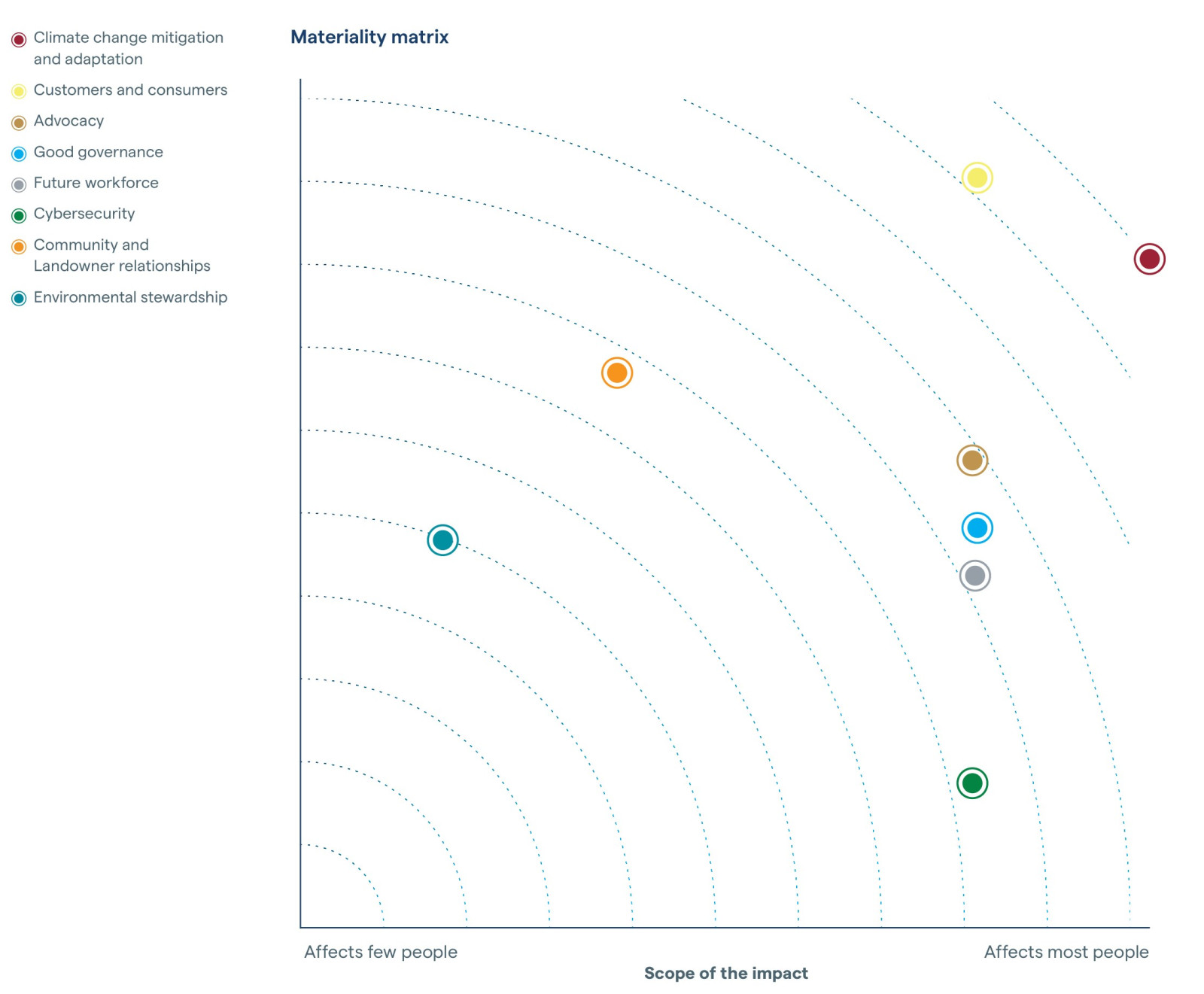As we look toward the growth of the grid to support increased electrification, we need to actively maintain a clear view on how we are perceived as an organisation, understanding and responding to stakeholder sentiment on our social, environmental and economic impacts.
We undertook an extensive materiality assessment in FY21. Since then, we have continued to evolve our understanding of material issues and deepen our understanding of the positive and negative impacts of each issue, their potential scale, scope and severity, and likely risk of occurrence.
In 2025, we undertook a further materiality assessment, pictured below. (This can also be found on p26 of our FY2025 Integrated Report.)

Our top materiality issues
The 2025 assessment showed while our most significant sustainability impacts have remained largely unchanged, their order has shuffled. There has been a marked increase in the importance of enabling new generation and load connections for our customers, to maintain confidence in security of supply as demand for electricity increases.
Our stakeholders consider “increasing the secure supply of electricity” is now the significant sustainability impact for Transpower. They are concerned about the transparency of prioritisation, timeliness, regulatory constraints and the fairness of up-front infrastructure costs.
Our second most impactful issue is in reducing system emissions. This speaks to our role in facilitating an increased share of renewables and decarbonising the wider energy system by enabling new investment in renewable generation and new load to support increasing electrification.
And thirdly, what matters most is the physical presence of our assets, affecting Māori, mana whenua, landowners, and communities. With major upgrades ahead, concerns include impacts on cultural values, land disturbance and disruption.
Significantly, the assessment has shown the interconnectedness of our priority sustainability impacts, and that the issues affecting the energy trilemma (security, affordability and sustainability) are inherently linked. Stakeholders believe that, for Transpower, security of supply is the most important aspect of the trilemma, followed by affordability. Sustainability is important only if the other two aspects can be satisfied first.
Other materiality issues
Advocacy – Our stakeholders recognise that Transpower is in a unique position to have an impact on and enable the ongoing decarbonisation of the electricity sector, and to inform related policy discussions and decisions. Feedback reflected on Transpower’s positive impact through facilitating research and innovation and our commitment to dialogue with those who are helping to shape a net zero carbon future.
Environmental stewardship – Our stakeholders recognise the potential impact Transpower has across a wide range of the country’s ecosystems and landscapes. Transpower’s biodiversity strategy takes a proactive stance via its commitment to a kaitiakitanga role in our day-to-day activities and a net biodiversity gain from future projects.
Future workforce – Transpower’s ability to recruit skilled professionals is seen as having an ongoing impact on our value creation as an organisation. Our stakeholders recognise that we have a vital role in attracting, training, and retaining a skilled workforce and that this benefits the wider New Zealand energy sector and ensures we can deliver on our decarbonisation goals.
Good governance – There are high expectations of our governance, particularly in our assurance of financial and non-financial disclosures. Stakeholders recognise the potential ongoing impact that long-term integrated thinking will have for the electricity sector. Our stakeholders consider it essential that our senior leadership are educated in environmental, social and governance issues to ensure robust decision-making and operations.
Cybersecurity – Risks to the electricity market and grid due to cyber-attacks continue to concern our stakeholders. Transpower’s robust cybersecurity and ongoing monitoring mitigates this risk.